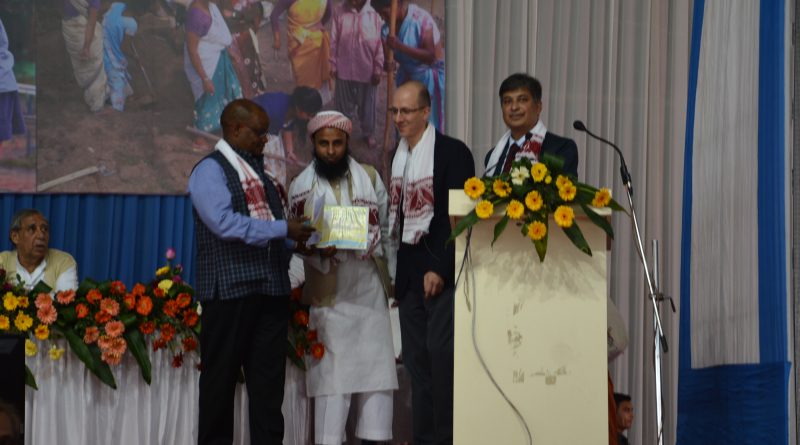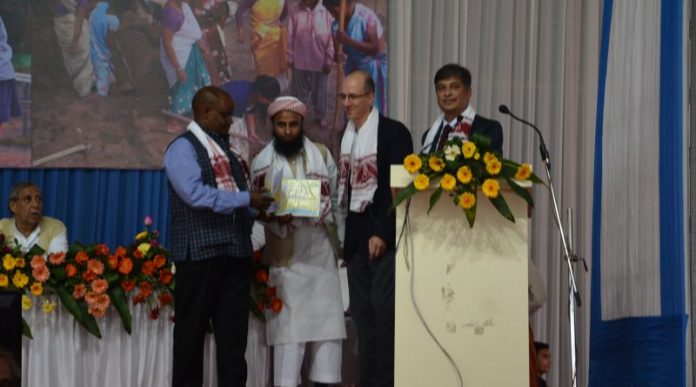By Abdul Gani, Twocircles.net
Guwahati: A week or so ago, the issue of Assam’s Islamic clerics coming together to pass a Fatwa against a young Muslim girl for singing a Hindu bhajan made for exciting news, and the mainstream media went to town with it. Except, no such Fatwa was passed. But it once highlighted how easy the media found it to stereotype Muslim clerics and paint them as conservatives who issue Fatwas against all and sundry at the drop of a hat.
And this is why, the story of Mufti Nasihur Rahman, the principal of Al Jamiatul Islamia Banat Madrassa in Assam’s Mangaldai, is extremely inspiring. Rahman calls himself a ‘Swachchta doot’ (Cleanliness agent) and uses his position and influence to inspire thousands to adapt to hygiene and cleanliness. No wonder, he has struck a chord with the audience. “Rahman saab talks of cleanliness and related issues during the Friday prayers when many people gather in the mosque. It is great to see a religious leader playing the role to bring a change in the society like this which is not so common,” said Ashraful Islam, a college student who attends Friday prayers with Rahman.

Rahman’s initiative has drawn much appreciation from people across the state. “We need more maulanas like him who talk about social issues and the larger good of society. Sanitation is an issue that concerns us all. If they are actively involved in issues like water, sanitation, and environment, they can usher in a behavioral change. This will, in turn, lead to building a strong country,” Teresa Rehman, a Guwahati-based journalist told Twocircles.net.
Rehman who also initiated a group called ‘sanitation scribes’ said that every day, some 1,800 children under the age of five die due to the lack of clean and healthy Water, Sanitation and Hygiene (WASH), with approximately 1,200-1,600 deaths in India.
Rahman started his cleanliness mission more than four years ago even before Prime Minister Narendra Modi started the Swachh Bharat Mission. “I have been doing this for over 10 years actually. But for the last four years I have started to do it dedicatedly when I realized people do listen to my advice,” said Rahman.
Initially, a section of people tried to mock at him for preaching on cleanliness being a cleric, many in the neighbourhood and followers appreciated his work.
“Every now and then, I use to take my girls in the front yards of our madrassa for cleaning works. It’s a habit I want them to get used to,” he added.
Maulana Rahman said that he has witnessed change among the people after he started his campaign of cleanliness. “It’s great to see how people have learned their lessons. I have gone to rural areas where people are not educated but now they have realised the importance of cleanliness. I will be conducting similar activities in coming days in various locations and madrasas,” Rahman told Twocircles.net.
Recently, Rahman conducted a cleanliness awareness camp at Dalgaon madrasa in Darrang district where around 200 students and locals attended. “It was a great success. We are focusing on many areas including physical activity for good health and education. Now I will visit some sandbars to create awareness on cleanliness and to make these areas open defecation free before I start focussing on Jorhat,” he added.
He has also made a habit of cleanliness for around 150 girls in his madrassa.
Water holds a significant position in many religion and culture. “If Influential opinion leaders, such as Government, elected representatives, media and faith leaders come together, they can play a critical role in achieving the State’s target on WASH. The Global Interfaith WASH Alliance (GIWA) is the world’s first organisation bringing together the leaders of the planet’s many faiths with the mission of ensuring that everyone, everywhere has access to safe and sustainable Water, Sanitation and Hygiene (WASH),” Tahseen Alam, Communications Officer of UNICEF Assam was quoted as saying by The Thumb Print magazine.
The Global Interfaith WASH Alliance (GIWA), the first global interfaith initiative to promote safe water, sanitation and hygiene, was launched by UNICEF in 2013, in a bid to bring together faith-based organizations to pursue a common goal of a water-secure world and equity in safe drinking water and adequate sanitation.
Rahman was present with other religious leaders at the Assam Conference on Sanitation (ASCOSAN) held in Guwahati recently.


